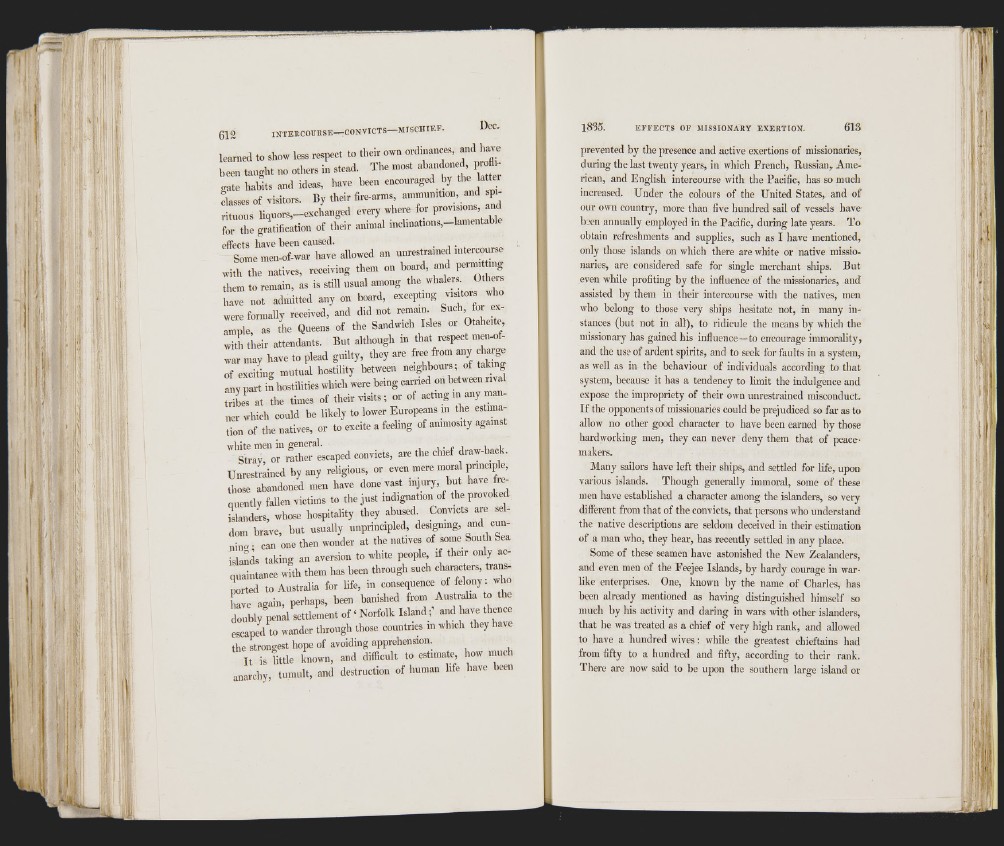
’ ll
■i
Y i a I
Lj
/ : -i
tal i%
!:
X -a i
!|* I
¡5 tFi
■
i]
U I 4 m
rt
612 i n t e r c o u r s e— CONVICTS MISCHIEF.
learned to show less respect to their own ordinances, and have
been taught no others in stead. The most abandoned profli-
i^ate habits and ideas, have been encouraged by the la tt«
dasses of visitors. By their fire-arms, ammunition, and spirituous
liquors,-exchauged every where for F «—
for the gratification of their annual inchnatious,-lamentahl
effects have been caused. . , .
Some men-of-wai- have allowed an unrestrained intercourse
with the natives, receiving them ou board, and permitting
them to remain, as is still usual among the whalers Others
L e not admitted any ou hoard, excepting - J o r s ^ who
were formally received, aud did not remain
araple, as the Queens of the Sandwich Isles or Otaheite,
with their attendants. But although in that respect men-of-
war may have to plead guilty, they are free from any chmje
of excitino- mutual hostility between neighbours; of takin
any part in hostilities which were being carried on between rival
triLs al the times of their visits ; or of acting in any manner
which could be l i k e l y to lower Europeans in the estimation
of the natives, or to excite a feehng of animosity against
white men in general. , . „ j i u
Stray, or rather escaped convicts, are the chief draw-bac^k.
Unrestrained by any religious, or e v e n mere moral princip e
those abandoned men have done vast lujury, but have fie-
quently fallen victims to the just indignation of tbe provoked
L u d e rs, whose hospitality they abused^ Convicts are seldom
brave, hut usually unprincipled, desiring, c '
niu“ ; can one then wonder at the natives of some Sou h Sea
islauM taking an aversion to white people if their only acquaintance
with them has been through such character^ trans-
L t e d to Australia for life, m consequence oi felony, who
have again, perhaps, been banished from Australia to the
d o u b l y penal settlemeut of ‘ Norfolk I s la n d a n d have thence
escaped to wander through those countries in which they have
the strongest hope of avoiding apprehension
I t is httle known, and difficult to estimate how much
anarchy, tumult, and destruction of human hfe have been
prevented by the presence and active exertions of missionaries,
during the last twenty years, in which French, Russian, American,
and English intercourse with the Pacific, has so much
increased. Under the colours of the United States, and of
our own country, more than five hundred sail of vessels have
haen annually employed in the Pacific, during late years. To
obtain refreshments and supplies, such as I have mentioned,
only those islands on which there are white or native missionaries,
are considered safe for single merchant ships. But
even while profiting by the influence of the missionaries, aud
assisted by them in their intercourse with the natives, men
who belong to those very ships hesitate not, in many instances
(but not in all), to ridicule the means by which the
missionary has gained his influence —to encourage immorality,
and the use of ardent spirits, and to seek for faults in a system,
as well as in the behaviour of individuals according to that
system, because it has a tendency to limit the indulgence and
expose the impropriety of their own unrestrained misconduct.
If the opponents of missionaries could be prejudiced so far as to
allow no other good character to have heen earned hy those
hardworking men, they can never deny them that of peacemakers.
Many sailors have left their ships, and settled for life, upon
various islands. Though generally immoral, some of these
men have established a character among the islanders, so very
different from that of the convicts, that persons who understand
the native descriptions are seldom deceived in their estimation
of a man who, they hear, has recently settled in any place.
Some of these seamen have astonished the New Zealanders,
and even men of the Peejee Islands, by hardy courage in wai--
like enterprises. One, known by the name of Charles, has
been already mentioned as having distinguished himself so
much by his activity and daring in wars with other islanders,
that he was treated as a chief of very high rank, and allowed
to have a hundred wives: while the greatest chieftains had
from fifty to a hundred and fifty, according to their rank.
There are now said to be upon the southern large island or
r ; ;
ii I 'll
, 4 j
ft
• > kP